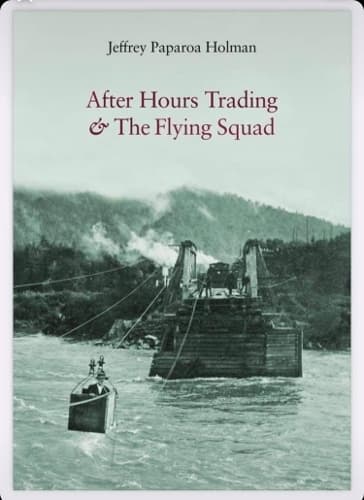Review: After Hours Trading & The Flying Squad
Reviewed by Paula Green
Jeffrey Paparoa Holman has published several volumes of poetry including the much loved As Big as a Father, shortlisted for the 2003 Montana New Zealand Book Awards. Holman’s new collection, After Hours Trading & The Flying Squad, is a book of two parts. The first section retrieves invisible South Island histories while the second pays homage to wide ranging loves, other poets, friends, pressing concerns.
Part One, Pākehā Mōteatea & Southern Sea Shanties, presents a crew of voices that build a prismatic view of the past. Individual speakers are bridges to a particular time and set of circumstances. You move from looking-up-at-the-stars reverie to complaints about climate change restrictions to a lonesome roadman in his isolated hut. The points of view are textured as voices both agree and disagree about the state of things. The weather is a constant refrain and the food references are piquant.
The poem that buried deepest under my skin is the final poem in the sequence, enter the silence. It returned me to the start of the collection with an increased sense of how poetry can refresh views of history. Just as a mountain wilderness may appear silent yet is rich in noise, so too are the relics, the hand-me-down past. Particularly in the imaginings and reckonings of an astute poet.
entering the silence that is not a silence
remains of a shoe by the mouth of a shaft
rusted boiler at a fork in the creek
pond of eels where the dredge dismantled
ended its song in a valley of tailings
entering the silence that is not a silence
enter a silence that never was
the wheels of a lokie sprouting fern
a railway signpost clothed in lichen
the sign to a mine where the dead
still linger lost to lovers dear to mothers
enter a silence that never was
from enter the silence
Part Two, Into the Mist, is delightfully eclectic in subject matter and has an ability to surprise. The ode-like poems speak to what is under threat, what is lost, what is imagined and what is exquisitely present. In the glance, a poem dedicated to Marilynne Robinson, a woman (I assume Marilynne) walks down the street with ‘two bags of books/ and gravity.’ Passing her by, the speaker craves the contents of the books that are trapped by gravity. She, however, wants privacy.
In my sidestep musings, I picture the contents of poems trapped by gravity. Reading may or may not set them free. Gravity as a force that anchors a poem fascinates but I shift to gravity as serious and Holman definitely offers serious. There are the Ōtautahi mosque attacks, endangered bees, floods, Covid-19. On the other hand, there is sheep shearing, the accumulative effect of a lifetime of reading, the beauty of birds.
Individual lines, stanzas, whole poems haunt me. It is to do with how we live, how we love and how we write. This, the opening stanza of The handpiece:
The house of words we made, in ruins: nobody
trusts the language now, not even as honey licked off
a spoon nor bent iron blown from a hundred roofs.
Holman writes with a measured step, with distinctive and diverse musical keys, with an ear attuned to the everyday and to a refreshing uplift of language. Repetition is a useful device, appearing like a refrain in a book of song, as a subterranean reminder that history repeats itself. Death, ruination, love, joy. This is a collection of poetry that will echo and nourish as we move through uncertain days.
Reviewed by Paula Green
